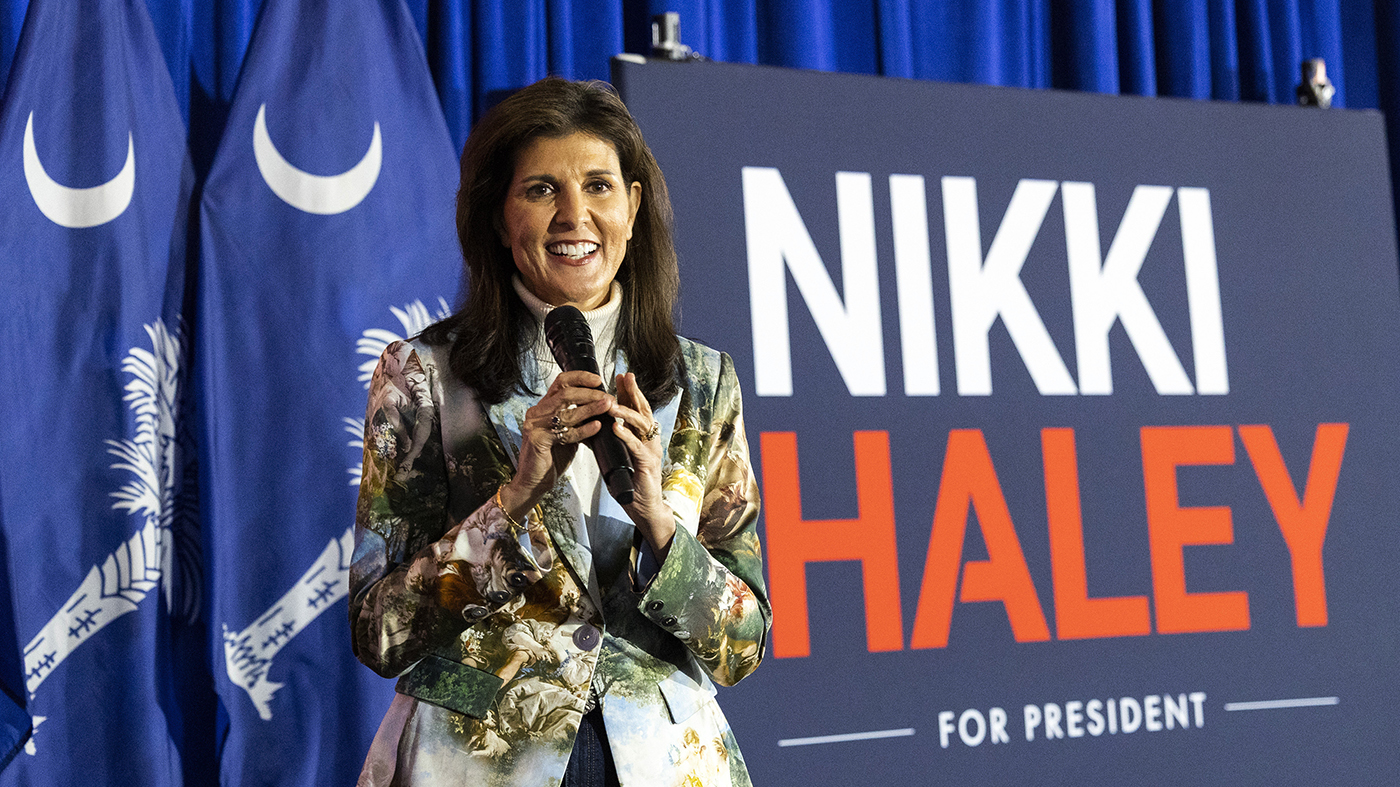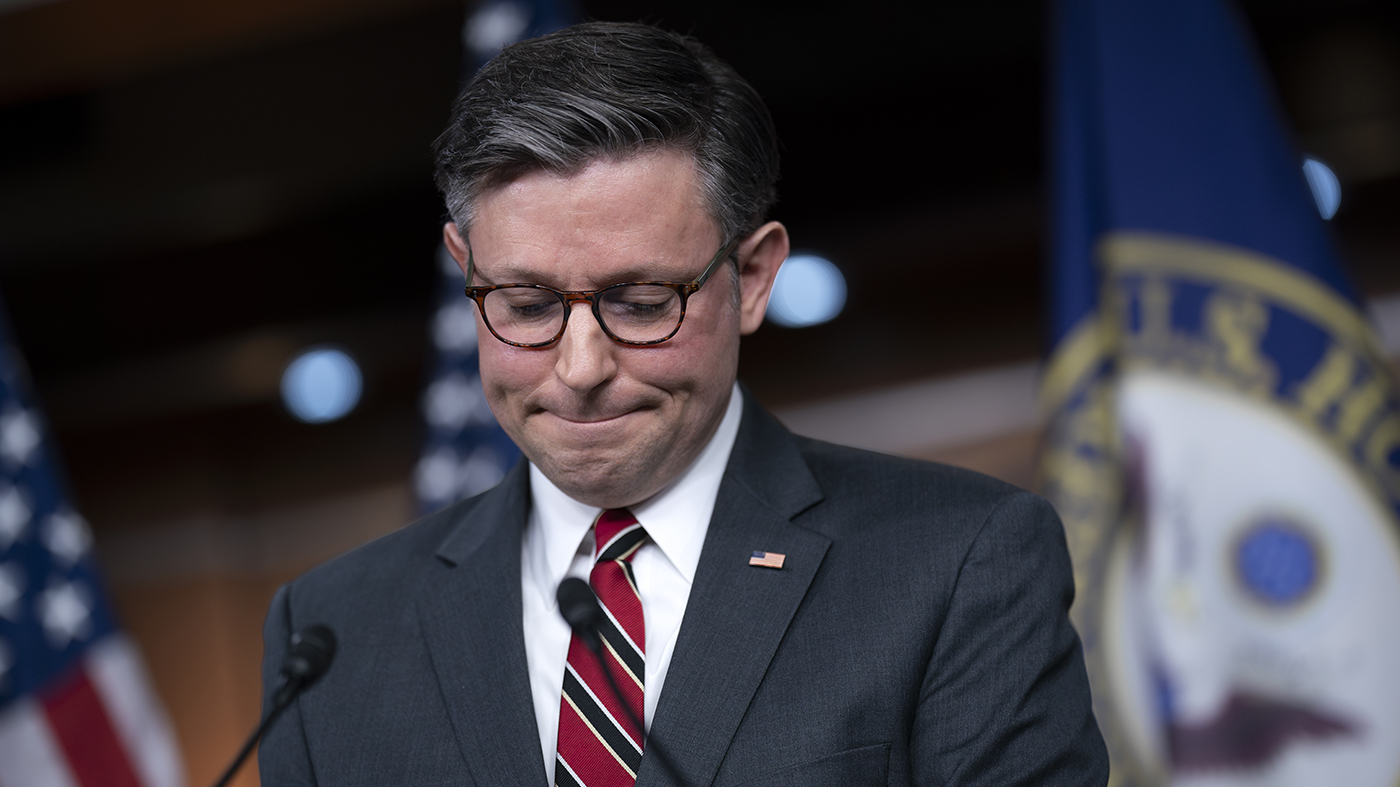Morning Report — Trump plays 2024 offense in courtroom defense
Editor’s note: The Hill’s Morning Report is our daily newsletter that dives deep into Washington’s agenda. To subscribe, click here or fill out the box below.
Former President Trump will be in a courtroom drama beginning March 25 in a New York trial just weeks after he hopes to lock up the GOP presidential nomination.
It may not be the only courtroom in which Trump appears as a defendant as voters weigh White House candidates and try to follow his legal proceedings. Trump, while asserting his innocence against 91 criminal indictments in four jurisdictions, insisted Thursday outside of court that he’s the victim of partisan politics.
“What it is, is election interference. It’s being run by Joe Biden’s White House. His top person was placed here in order to make sure everything goes right,” Trump told reporters without evidence.
His legal jeopardy — interwoven with the power he wields as the de facto leader of the Republican Party and social-media-fueled influencer on Capitol Hill — is unprecedented. Polls indicate that Trump’s supporters are largely unmoved by assertions that the former president flouted the Constitution, laws and his oath of office. But a majority of Americans say they would not vote for him if he’s convicted or imprisoned by the time of November’s race. That includes more than half of Republican voters, according to a recent poll.
On Thursday, Trump failed to get a hush money case dropped that involves adult film performer Stormy Daniels and former Trump Organization lawyer Michael Cohen, who went to prison in 2019 for fraud, criminal tax evasion and campaign finance violations.
Judge Juan Merchan said the timing of Trump’s trial would enable a jury to wrap up in advance of July’s scheduled Republican National Convention. Manhattan District Attorney Alvin Bragg (D) charged Trump last spring with 34 counts of falsifying business records to hide reimbursements Trump made in 2016 to Cohen to compensate Daniels for her silence during his presidential campaign. The former president has denied a relationship with the porn star (The Hill).
Separately today in a New York civil fraud case in which Trump was found guilty, Judge Arthur Engoron is expected to order a monetary penalty (NBC News). The prosecution recommended Trump and his company pay $370 million as punishment for altering property valuations to secure favorable loans and to lower tax liabilities.
Trump attorney Alina Habba predicted her client will be unhappy with the verdict (The Hill). “If I could file the appeal now, I would,” Habba said in a Newsmax interview. “There’s no surprises coming here. I’ll be loud and booming right after the decision. I don’t have high hopes.”
The real courtroom fireworks Thursday took place in Georgia, where Fulton County District Attorney Fani Willis (D) took the stand and sought to hold onto her prosecution while denying during a hearing that she gained financial benefits because of her relationship with then-married colleague and special prosecutor Nathan Wade. The hearing continues today.
Willis and Wade are in the midst of a complex criminal racketeering case alleging Trump and other defendants sought to overturn Georgia’s 2020 election results. Willis and her team could be removed from the prosecution, which conceivably could advantage Trump’s defense by triggering delays this year if Fulton County is ordered to regroup (The Hill).
▪ The Hill: Five revelations from the explosive Willis testimony in Georgia.
▪ The Hill’s The Memo: Willis, Trump collide over dramatic day: Five takeaways.
Trump also faces federal criminal trials, one in Florida dealing with classified documents, which has moved slowly, and the other in Washington alleging election interference. Trump asserts he is immune from prosecution for actions and decisions while he was president, seen as a novel legal claim the Supreme Court has been asked to swiftly untangle.
3 THINGS TO KNOW TODAY
▪ ⚖️ The Justice Department indicted Alexander Smirnov, 43, an FBI source, for lying to the bureau about Joe Biden and Hunter Biden and Ukrainian energy company Burisma during the 2020 presidential campaign. The Hill’s Rebecca Beitsch reports that Smirnov’s indictment risks unwinding a House GOP probe of the president.
▪ ⚡ In response to an Iranian-backed militia attack that killed three Americans, the U.S. more than a week ago conducted a cyberattack against an Iranian military ship that had been collecting intelligence on cargo vessels in the Red Sea.
▪ 🚀 Set your calendars for a planned Feb. 22 unmanned U.S. lunar landing. Odysseus, the privately built equipment designed to set down on the moon’s surface, headed into space early Thursday riding in a SpaceX rocket.
LEADING THE DAY
© The Associated Press / Mic Smith | Former U.N. Ambassador Nikki Haley at a campaign event in Summerville, S.C. on Tuesday.
POLITICS
Former U.N. Ambassador Nikki Haley is framing her path to the GOP presidential nomination as a long, state-by-state war of attrition. But while Haley battles for the public opinion against Trump, the runaway front-runner, the GOP’s delegate rules are not working in her favor. Ahead of the crucial Feb. 24 South Carolina primary, Haley has spent much of the week in her home state. And she’s closing out the week in Texas, a critical Super Tuesday state in March.
But both states — and many others on Haley’s path forward — reward candidates who can win majorities of the vote in states or congressional districts, which presents a likely outcome in what’s now a one-on-one race where Haley trails significantly in the polls (NBC News). According to The Hill and DecisionDeskHQ’s average of polls, Trump holds a 34.8 point lead in the Palmetto State.
On Thursday, the one-year anniversary of her entering the presidential race, Haley sat down with Houston Chronicle’s editorial board for a wide-ranging discussion about border security, energy policy and state power, among other topics.
In South Carolina on Wednesday, Haley surrogate Don Bolduc, a retired Army brigadier general who served 10 tours in Afghanistan, told reporters that Trump does not deserve a second term after his comments about Haley’s husband’s military service.
“That is a bridge too far,” Bolduc said. “Mr. former president, you have crossed the line in that behavior, that moral aspect of you doesn’t deserve to be president of the United States.”
▪ The New York Times: These South Carolina voters know Haley’s chances against Trump, but they’re voting for her anyway.
▪ Politico: Why is Haley struggling in South Carolina? “Relationship management 101,” said former Gov. Mark Sanford (R).
2024 ROUNDUP
▪ Poll: 👉 Biden’s age problem is crystal clear in a new Monmouth University survey. Overall, 51 percent of voters say they’re at least somewhat confident that Trump has the mental and physical stamina necessary to carry out the job of president. Just 32 percent say the same about Biden. It reflects a significant shift from four years ago and it feeds into voter hesitation: Nearly half the electorate foresees the possibility that Biden may be replaced as the Democratic nominee before November, primarily for health reasons.
▪ Centrist Sen. Joe Manchin (D-W.Va.), who is not seeking reelection while mulling a possible third-party race for the White House, name-dropped Sen. Mitt Romney (R-Utah) and former Sen. Rob Portman (R-Ohio) as potential running mates. Manchin previously said he’d make a decision after Super Tuesday’s primary results next month.
▪ Poll: Biden performs better against Trump compared with hypothetical matchups involving Vice President Harris or California Democratic Gov. Gavin Newsom, according to a new survey.
▪ Transition to governing update: Trump wants to fire tens of thousands of federal workers if he wins the presidency and replace them with loyalists while reshaping the federal government. Liberals are preparing to fight back.
▪ What are Democrats learning about immigration following Tom Suozzi’s victory in Tuesday’s New York special election? He’s the Democrat who defeated a GOP candidate to fill an open House seat created by the exit of former Republican Rep. George Santos.
▪ In Montana, GOP Rep. Matt Rosendale on Thursday dropped his Senate primary bid less than a week after launching it. The surprising reversal favors the Republicans who backed the Trump-endorsed Tim Sheehy and sought to avert a costly, bruising primary while working to defeat Sen. John Tester (D-Mont.) in November.
▪ Former Republican presidential candidate and New Jersey Gov. Chris Christie, an outspoken Trump critic, said Wednesday he has not ruled out voting for Biden in November.
▪ A Trump spokesperson denied the former president is considering delivering the GOP rebuttal to Biden’s State of the Union address, scheduled March 7.
WHERE AND WHEN
The House meets at 10 a.m.
The Senate will hold a pro forma session at 3:30 p.m.
The president will travel to East Palestine, Ohio, to be briefed on response and recovery efforts and to speak about administration efforts to hold Norfolk Southern accountable for last year’s derailment accident (NewsNation). Biden later will fly from Ohio to Rehoboth Beach, Del.
The vice president is in Germany where she will address the Munich Security Conference at 8:30 a.m. ET and will meet with President Isaac Herzog of Israel at Hotel Bayerischer Hof. Harris also will meet at the hotel with Prime Minister Mohammed Shia Al-Sudani of Iraq. She will confer with Prime Minister Robert Golob of Slovenia. In the evening, Harris plans to meet with U.S. lawmakers who are attending the conference.
Secretary of State Antony Blinken is in Germany with a long itinerary. He will meet at midday with Bulgarian Prime Minister Nikolay Denkov in Munich, followed by a meeting with Indian Minister of External Affairs Subrahmanyam Jaishankar. Blinken will attend Harris’s afternoon remarks to the Munich Security Conference. He’ll meet with Wang Yi, China’s foreign minister and director of the Office of Foreign Affairs Commission. In separate evening meetings, the secretary will confer with German Chancellor Robert Habeck and German Foreign Minister Annalena Baerbock.
ZOOM IN
© The Associated Press / Adel Hana | Palestinians search for survivors after an Israeli airstrike in central Gaza on Thursday.
INTERNATIONAL
BIDEN HAS AGAIN CAUTIONED Israeli Prime Minister Benjamin Netanyahu against moving forward with a military operation in the southern Gaza city of Rafah without a “credible and executable plan” to protect civilians. However, Netanyahu vowed early on Friday to reject “international dictates” on a long-term resolution of Israel’s conflict with the Palestinians (The Hill). Netanyahu told Secretary of State Antony Blinken last week that a direct or indirect U.S. recognition of a Palestinian state “would be a prize for those who planned and orchestrated the Oct. 7 massacre,” Axios reports. Such recognition by the U.S. would change decades of American policy that advocated for a Palestinian state only as a result of direct negotiations with Israel.
ISRAELI FORCES RAIDED the biggest functioning hospital in Gaza on Thursday, the military said. Footage from Nasser Medical Complex in Khan Younis showed chaos, shouting and gunfire in dark corridors filled with dust and smoke. Israel’s military called the raid “precise and limited” and said it was based on information that Hamas militants were hiding and had kept hostages in the facility, with some bodies of captives possibly there. But the incursion raised alarm over the fate of hundreds of patients and medical workers and the many displaced Palestinians who had sought shelter there from the war (Reuters and The New York Times).
The U.N. Human Rights Office said Thursday that Israel’s raid on Nasser Hospital appeared to be “part of a pattern of attacks” on “life-saving civilian infrastructure in Gaza, especially hospitals” (The Washington Post).
▪ The Hill: This is why Rafah, in the southernmost part of Gaza, is a key flashpoint in Israel’s war against Hamas.
▪ Reuters: Egypt setting up area at the Gaza border which could be used to shelter Palestinians, sources say.
THE CIVILIAN DEATH TOLL from two Israeli airstrikes in Lebanon has risen to 10, Lebanese state media reported Thursday, making the previous day the deadliest in more than four months of cross-border exchanges. Hezbollah vowed to retaliate with strikes into northern Israel (The Hill). While analysts say that Israel and Hezbollah would both like to avoid an all-out battle, the past two days of attacks have led to an escalating war of words between officials on both sides — and a wider regional conflict (NPR).
RUSSIA IS PREPARING TO POTENTIALLY DEPLOY a nuclear weapon in space that could threaten other satellites, according to several media reports, a national security concern that has overtaken Washington this week and raised speculation about what the weapon actually is. While the Biden administration has refrained from sharing any details on the covert weapon system, Russia’s history of developing nuclear weapons and anti-satellite weapons leaves behind some clues as to what it may be. The Hill’s Brad Dress breaks down everything we know so far.
White House spokesperson John Kirby confirmed Thursday that the intelligence is related to what he called “an anti-satellite capability” he said was still being developed by Russia, but declined to answer whether that system would be considered a nuclear weapon or nuclear capable (The Hill and ABC News).
“First, this is not an active capability that’s been deployed. And though Russia’s pursuit of this particular capability is troubling, there is no immediate threat to anyone’s safety,” Kirby said. “We’re not talking about a weapon that can be used to attack human beings or cause physical destruction here on Earth.”
▪ The Hill: House Intelligence Committee Chair Rep. Mike Turner (R-Ohio), who raised concerns about the threat Wednesday, is facing backlash. A House Republican said his vague call to declassify a national security threat was done with “reckless disregard” and urged a formal inquiry.
▪ Politico: Why Russia won’t have its anti-satellite weapon in space anytime soon.
IN A SHOW OF SUPPORT FOR NATO, Biden will host Polish President Andrzej Duda and Prime Minister Donald Tusk at the White House in March. The visit coincides with Poland’s 25-year anniversary of joining the military alliance, and marks support for NATO after Trump signaled he would undermine the alliance in a potential second term (The Hill).
ELSEWHERE
© The Associated Press / J. Scott Applewhite | Speaker Mike Johnson (R-La.) at the Capitol on Wednesday.
CONGRESS
DEMOCRATS’ VICTORY THIS WEEK in a New York special election marks the latest trouble for Speaker Mike Johnson (R-La.) as he scrambles to unite his turbulent conference and steer it through a series of legislative mazes heading into November’s high-stakes elections, write The Hill’s Mike Lillis and Mychael Schnell.
Former Rep. Tom Suozzi’s (D-N.Y.) victory on Long Island flipped a Republican seat to the Democrats and pruned the GOP majority from three seats to two just as Congress is entering a series of partisan battles in which every vote is precious. Suozzi’s arrival on Capitol Hill will only compound Johnson’s burden, shrinking his edge as he seeks to bridge divisions within his warring conference, keep his gavel while under threat of a coup, fund the government to prevent a shutdown and more generally demonstrate to voters that Republicans are able legislators ahead of November’s elections.
On March 12, special counsel Robert Hur will testify to the House Judiciary Committee about his findings before clearing Biden of criminal wrongdoing for possessing classified materials following his vice-presidential service. Republicans in Congress hope to gain political advantage with Hur’s conclusion that Biden has a hazy memory (The Hill).
IRS IN THE HOT SEAT: Commissioner Danny Werfel appeared before the House Ways and Means Committee on Thursday morning at a dynamic moment for U.S. tax policy and administration. The Hill’s Tobias Burns has rounded up six key takeaways from the hearing — from how fast the agency can implement Congress’s new bipartisan tax deal to how funding for the IRS has worked since a quarter of the $80 billion in additional funding for the agency was scaled back due to Republican opposition.
TRENDS
LEARNING LOSS: School guidance around when students should stay home due to illness has become a key focus point as chronic absenteeism has skyrocketed since COVID-19, fueling learning loss. The Hill’s Lexi Lonas reports that during the height of the pandemic, educators were advising parents to keep their children home at any sign of sickness due to fear it could be COVID-19. Now, school officials and health care professionals are adamant about finding the balance between the necessity of letting sick students stay home, and the consequences of children missing school.
▪ The Hill: The administration announced Thursday that it will seek to give student debt forgiveness to those experiencing “hardship” in the president’s latest plan for debt relief.
▪ The Hill: A government watchdog found serious lapses in how the Department of Health and Human Services vetted sponsors for a wave of unaccompanied migrant children that arrived in the U.S. along the Mexican border in 2021.
OPINION
■ Western weapons are Ukraine’s only hope, by Jillian Kay Melchior, editorial board member, The Wall Street Journal.
■ America should thank immigrants for the `soft landing,’ by Dany Bahar, opinion contributor, The Hill.
THE CLOSER
© The Associated Press / Susan Walsh | President Biden in Rehoboth Beach, Del., in 2021
And finally … 👏👏👏 Bravo to winners of this week’s Morning Report Quiz! Recall that we looked for some smart guesses about aging, cognition and memory.
Here are the savvy puzzlers who triumphed: Pam Manges, Terry Pflaumer, Luther Berg, Gary Duncan, Jaina Mehta Buck, Ken Schomake, Linda Field, Sawyer Walters, Jerry LaCamera, Mary Anne McEnery, Tim Abeska, Kaylan Szafranski, Richard Baznik, Don Swanson, Lynn Gardner, Patrick Kavanagh, Ki Harvey, Harry Strulovici, Bill Bachmann, Steve James and Phil Kirstein.
They knew that stress, depression, lack of sleep and dehydration can cause forgetfulness, according to scientists. The answer we looked for was “all of the above.”
Super-ager is a catchy term used by specialists for someone aged 80 or older who exhibits cognitive function comparable to an average person who is middle-aged.
From our quiz list of achievers from the realm of politics, former President George H.W. Bush was the exception among those diagnosed with dementia or Alzheimer’s disease near the end of their lives. (Bush suffered from a rare form of Parkinson’s disease.)
President Biden, 81, will not take a cognitive test during his upcoming physical exam, his press secretary said Monday. The answer we looked for was “false.”
Stay Engaged
We want to hear from you! Email: Alexis Simendinger (asimendinger@digital-stage.thehill.com) and Kristina Karisch (kkarisch@digital-stage.thehill.com). Follow us on X, formerly known as Twitter: (@asimendinger and @kristinakarisch) and suggest this newsletter to friends!
Copyright 2023 Nexstar Media Inc. All rights reserved. This material may not be published, broadcast, rewritten, or redistributed. Regular the hill posts











